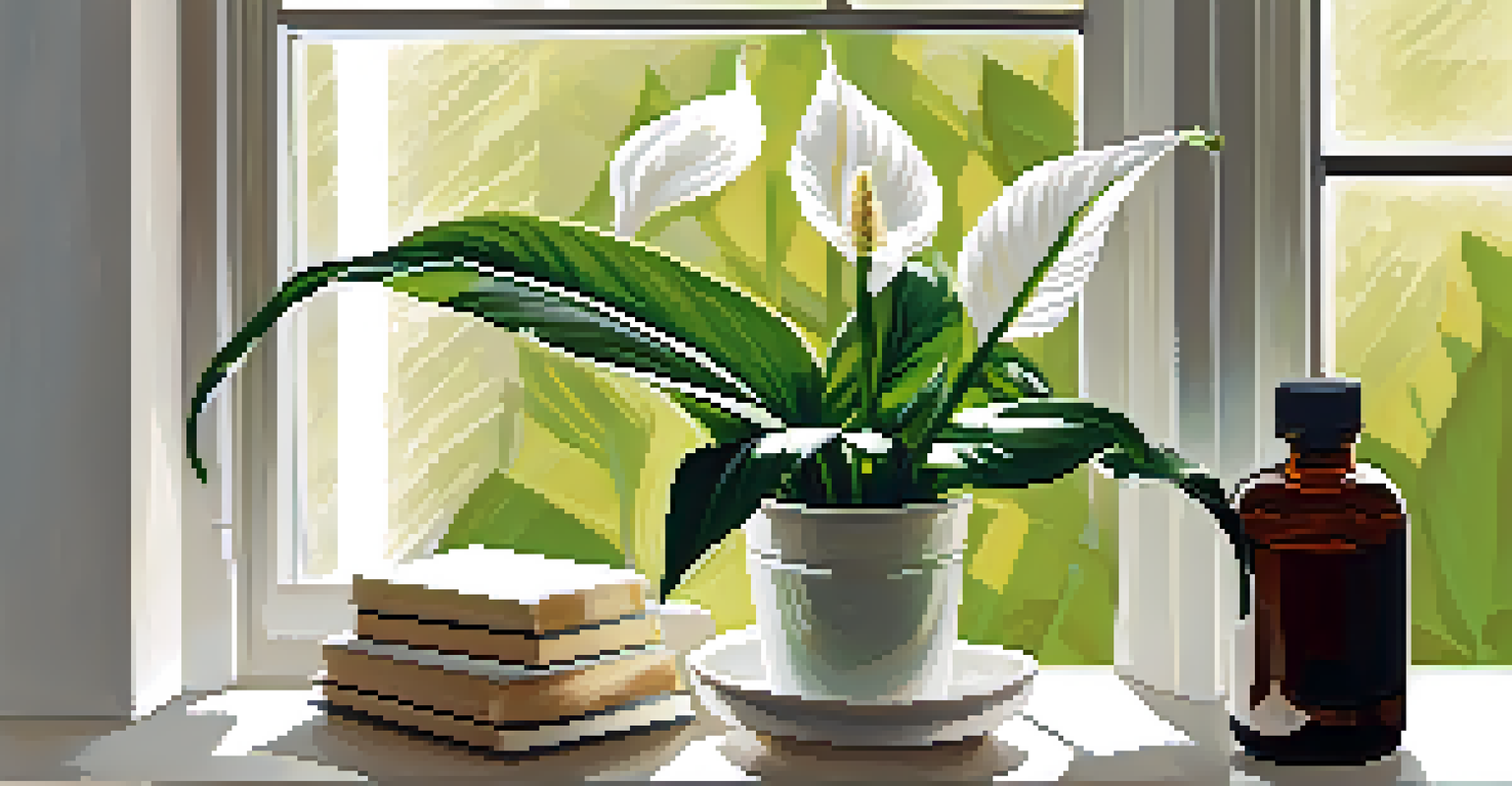Aromatherapy and Plants: Scented Relief for Stress

Understanding Aromatherapy: A Brief Overview
Aromatherapy is a holistic healing practice that uses natural plant extracts, known as essential oils, to promote physical and emotional well-being. These oils are usually extracted from flowers, leaves, and roots, each carrying unique scents and properties. Essentially, aromatherapy harnesses the power of these scents to influence mood and health, making it an appealing option for stress relief.
The use of essential oils in aromatherapy can help create a relaxing and healing environment, supporting emotional and physical wellness.
The calming effects of certain aromas have been explored for centuries, with roots in ancient cultures that recognized the therapeutic benefits of plants. For example, lavender has long been celebrated for its soothing qualities, while citrus scents like lemon and orange can uplift spirits. As we breathe in these delightful fragrances, our brains respond by triggering a relaxation response, helping to alleviate stress.
Incorporating aromatherapy into your daily routine can be as simple as using a diffuser or applying diluted essential oils topically. The key is to find scents that resonate with you personally, creating a customized approach to managing stress through the power of plants.
The Science Behind Aromatherapy and Stress Relief
While aromatherapy is often seen as a holistic practice, there is scientific evidence supporting its effectiveness in reducing stress. Studies show that certain scents can lower cortisol levels, the hormone associated with stress, leading to a more relaxed state. This physiological change highlights the deeper connection between our sense of smell and emotional responses.

When we inhale essential oils, they interact with our limbic system, the part of the brain that controls emotions and memories. This connection explains why certain scents can instantly transport us to a more peaceful state of mind. For instance, the scent of chamomile is known to evoke feelings of calmness and tranquility, making it a popular choice for stress relief.
Aromatherapy and Stress Relief
Aromatherapy uses essential oils to promote relaxation and emotional well-being, making it an effective tool for stress management.
Moreover, the act of engaging with these scents can be a mindful practice in itself. By taking a moment to breathe deeply and focus on the fragrance, we can create a calming ritual that helps us step away from the chaos of daily life, reinforcing the stress-relieving benefits of aromatherapy.
Popular Essential Oils for Stress Relief
When it comes to choosing essential oils for stress relief, several stand out for their calming properties. Lavender is often at the top of the list, renowned for its ability to induce relaxation and improve sleep quality. Similarly, bergamot and ylang-ylang have been shown to reduce anxiety and promote a sense of well-being.
Aromatherapy is about the power of scents and how they can influence our emotions and well-being.
Another essential oil gaining popularity is frankincense, which is not only soothing but also known for its grounding effects. This oil is often used in meditation practices, helping individuals achieve a deeper state of relaxation. Additionally, peppermint offers a refreshing scent that can invigorate the senses while calming the mind, making it a versatile option.
Blending different oils can also enhance their effects. For example, a combination of lavender and chamomile can create a powerful calming blend, perfect for winding down after a stressful day. Experimenting with various combinations can lead to unique scents that cater to your personal relaxation needs.
Incorporating Aromatherapy into Your Routine
Integrating aromatherapy into your daily life doesn't have to be complicated. Start by selecting a few essential oils that resonate with you and find a method of application that suits your lifestyle. Whether it's using a diffuser, adding oils to your bath, or applying them to pulse points, there are many ways to enjoy the benefits.
Creating a calming environment can significantly enhance the stress-relief experience. Consider setting aside a few minutes each day for a dedicated aromatherapy session—this could be while enjoying a warm cup of tea or during a quiet moment before bedtime. By making this a regular practice, you can cultivate a personal sanctuary of peace.
Science Supports Aromatherapy
Research indicates that certain scents can reduce cortisol levels and influence emotional responses, validating the effectiveness of aromatherapy.
Don't forget to listen to your body and adjust your approach as needed. Some days you might crave the soothing scent of lavender, while other days, a refreshing citrus aroma might be more appealing. This flexibility allows you to tailor your aromatherapy experience to your current needs, making it a truly personalized form of stress relief.
Plants That Complement Aromatherapy
In addition to essential oils, certain plants can enhance the aromatherapy experience and contribute to stress relief. For instance, keeping a potted lavender plant in your home not only provides a beautiful aesthetic but also releases calming scents when the leaves are brushed or disturbed. This can create a serene atmosphere that complements your aromatherapy practices.
Another example is the peace lily, which is not only known for its air-purifying qualities but also emits a subtle fragrance that can help uplift your mood. Having these plants around can create a relaxing environment, making it easier to unwind after a long day.
Incorporating these plants into your home or workspace can also serve as a gentle reminder to pause and take a breath. The act of caring for them can be therapeutic in itself, adding an extra layer of stress relief to your daily routine.
Creating a Stress-Relief Ritual with Aromatherapy
Establishing a stress-relief ritual that incorporates aromatherapy can be a powerful way to anchor your day. Consider setting aside time in the morning or evening to engage in a simple routine that involves your favorite scents. This could be as easy as lighting a scented candle, diffusing essential oils, or practicing deep breathing while inhaling calming aromas.
The key to a successful ritual is consistency. By making aromatherapy a regular part of your routine, you signal to your body that it's time to relax and unwind. Over time, this practice can help condition your mind to associate certain scents with a peaceful state, enhancing their stress-relief effects.
Personalize Your Aromatherapy
Finding and experimenting with scents that resonate with you allows for a tailored approach to stress relief through aromatherapy.
You might also want to pair your aromatherapy ritual with other relaxing activities, such as meditation, yoga, or journaling. This holistic approach allows you to create a multi-sensory experience that promotes overall well-being, further alleviating stress and anxiety.
Final Thoughts on Aromatherapy and Stress Relief
Aromatherapy offers a natural and accessible approach to managing stress, allowing individuals to harness the calming power of plants. By understanding the science behind it and exploring various essential oils, you can create a personalized stress-relief strategy that works for you. Remember, the journey to relaxation is unique for everyone, so take the time to experiment with different scents and methods.
As you incorporate aromatherapy into your life, it’s essential to remain mindful of your own needs and preferences. The beauty of this practice lies in its flexibility, allowing you to adapt your approach as your stress levels change. Listening to your body and responding to its cues will enhance the effectiveness of your stress-relief efforts.

Ultimately, embracing aromatherapy can be a delightful way to reclaim your peace of mind. By surrounding yourself with soothing scents and engaging in mindful practices, you can create a sanctuary of calm amidst the chaos, paving the way for a more balanced and stress-free life.